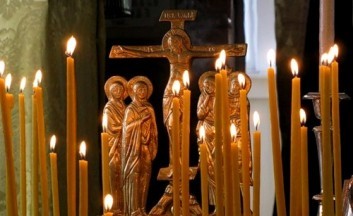Authorities fear that churches’ authority will grow, and cooperation between them will increase
 The situation has not changed
The situation has not changed

A national march under the slogan of ‘For Life, For Family, For Children’ aimed at promoting birth and family values and initially planned for September 21st in Minsk, will not take place due to a ban by the authorities.
Despite the announced cooperation between the government and the Orthodox Church and, to a lesser extent, the Catholic and Protestant Churches in Belarus, the authorities do not welcome independent initiatives coming from the church community. The Belarusian government is afraid of the churches’ growing influence among the population, against reduced social benefits offered by the state. The authorities also fear churches cooperating with one another and their potential entry into politics. In turn, churches are not interested in exacerbating relations with the authorities and try to avoid conflicts, mostly acting behind-the-scenes.
The march was a joint initiative by the Orthodox, Catholic and Protestant churches. The joint event was endorsed by the senior clergy of the Orthodox and Catholic churches. Blessing for the rally was given by Catholic Metropolitan Tadeusz Kondrusiewicz and Orthodox Metropolitan Filaret. The march’s organizers were a number of charitable non-profit organizations that are close to the church circles. The event was banned despite its constructive nature, which aimed at addressing the state’s demographic policy. The authorities saw a threat in the event’s potentially political nature and the opportunity for the churches to enter the political arena. The Belarusian Christian Democracy Party had also announced its support for the march.
Currently, Belarus’ social state is shrinking and it is no longer able to provide the same level of social protection for its citizens. However, the authorities are not willing to delegate such functions to independent public institutions, even loyal ones, fearing their increased influence on social processes. It is noteworthy that confidence in the Orthodox (70%) and Catholic (44%) churches is higher than the confidence level in most government institutions.
In the Belarusian authorities’ view, cooperation with the Church should bear a servile character. In 2003, the Agreement on Cooperation between the Republic of Belarus and the Belarusian Orthodox Church was signed in order to address social issues. However, the authorities see this relationship developing only within strictly defined framework, which does not imply independent initiatives by the Church. In addition, President Lukashenko sees the Orthodox Church as being built into the state system. In July 2013, he said “I think we are on the verge of some reform: calm, evolutionary, incremental reform of the Orthodox Church, and maybe not only the Orthodox Church”.
Catholic and Protestant Churches are more independent from the state and therefore bear the costs of such independence. In July, Belarusian secret services detained Vladislav Lazarus, a Catholic priest. He is accused of sending money and property to a person who is accused of spying for another country. The Catholic Church has not supported the petition, initiated by some activists, demanding the priest’s release. This week, the Conference of Catholic Bishops called upon “the believers to entrust this painful problem to the God’s mercy”. The Catholic Church does not want to exacerbate relations with the Belarusian authorities, and is pressing for the conflict to be resolved in backroom negotiations.
Thus, the Belarusian authorities will seek to keep the churches’ activities within the existing framework. Churches, in turn, are afraid to contact public and political organizations. The decision about Vladislav Lazarus’ fate will largely depend on secret negotiations between the Catholic hierarchs (potentially with the participation of Vatican representatives) and the Presidential Administration.
Subscribe to our newsletter




Situation in Belarus
Constitutional referendum: main consequences


 Video
Video
How to count the political prisoners: are the new criteria needed?


 Video
Video
Paternalism In Decline, Belarusian Euroscepticism, And The Influence Of Russia


 Video
Video












